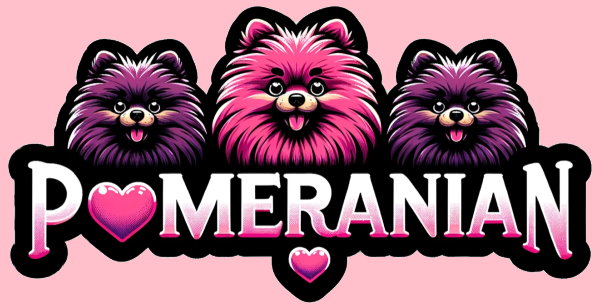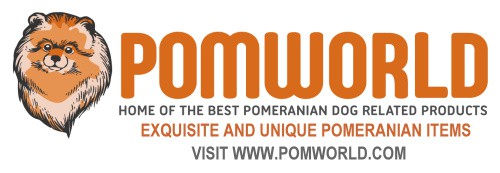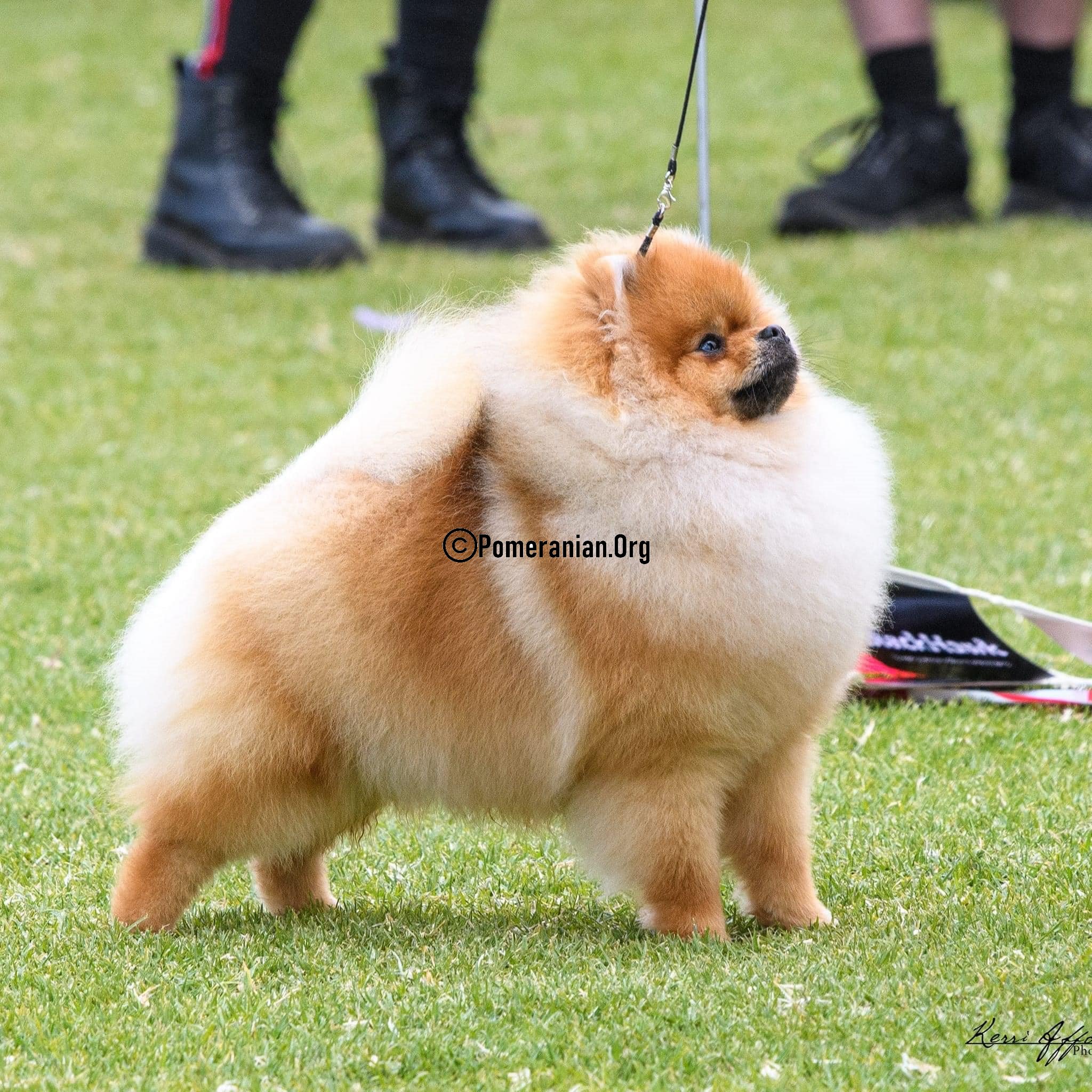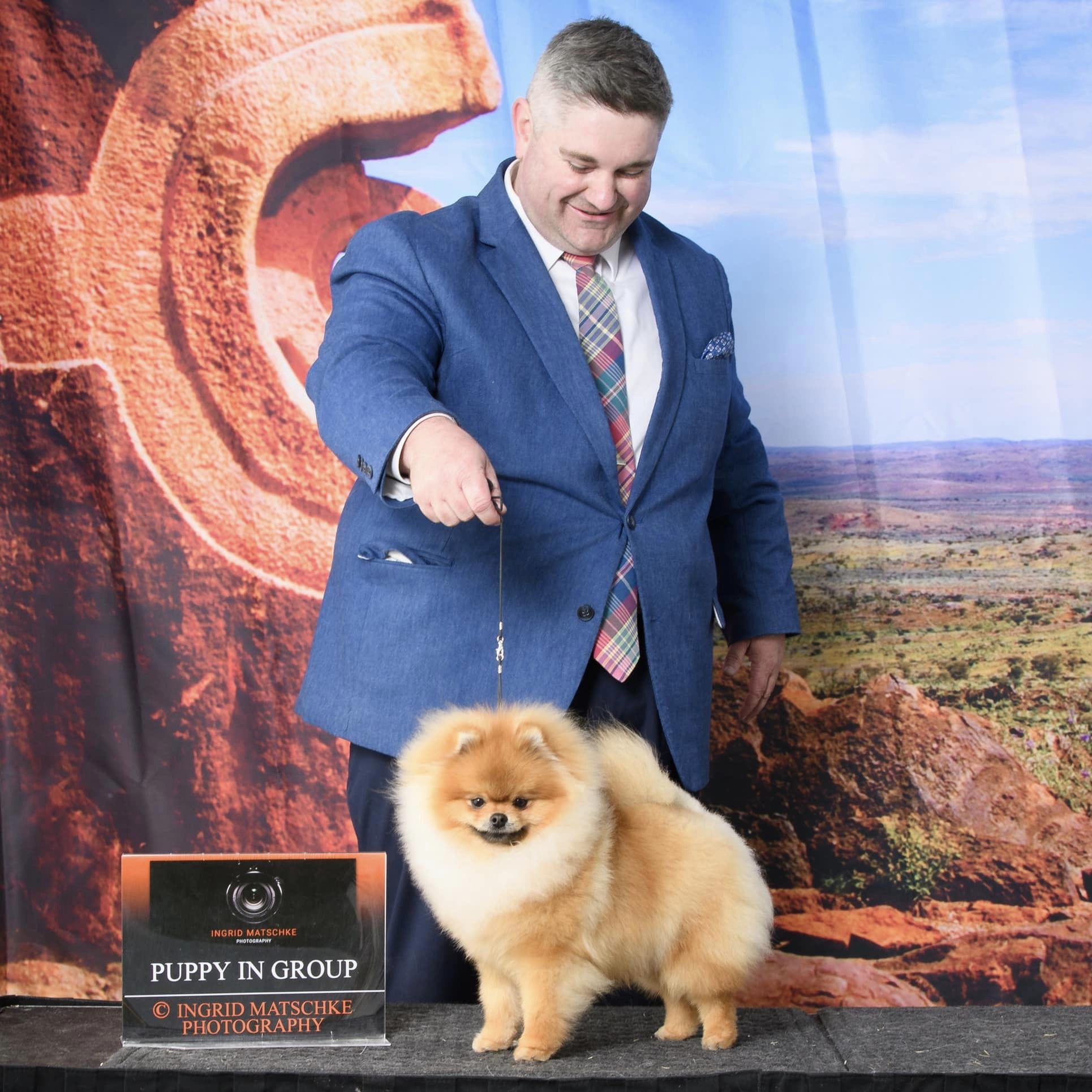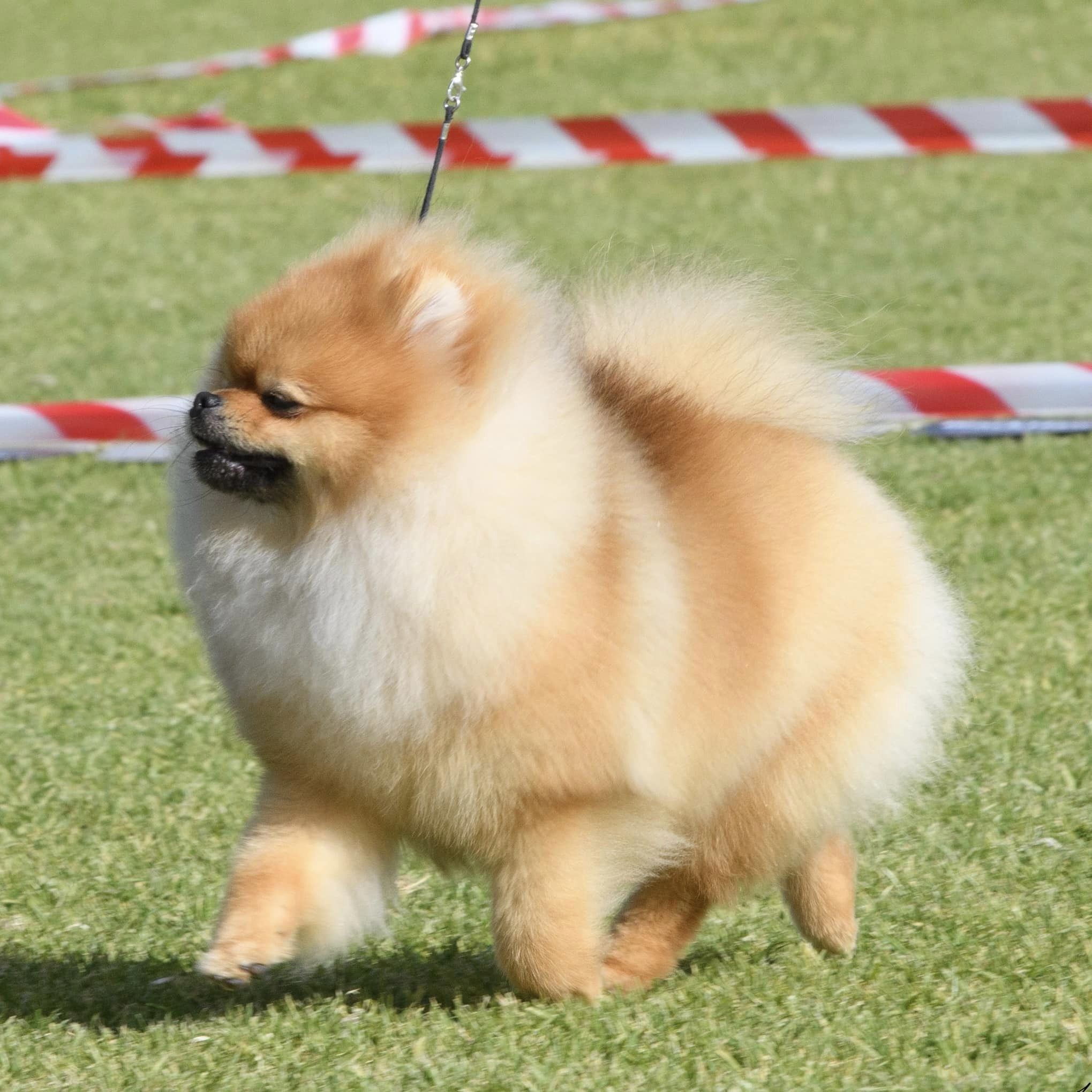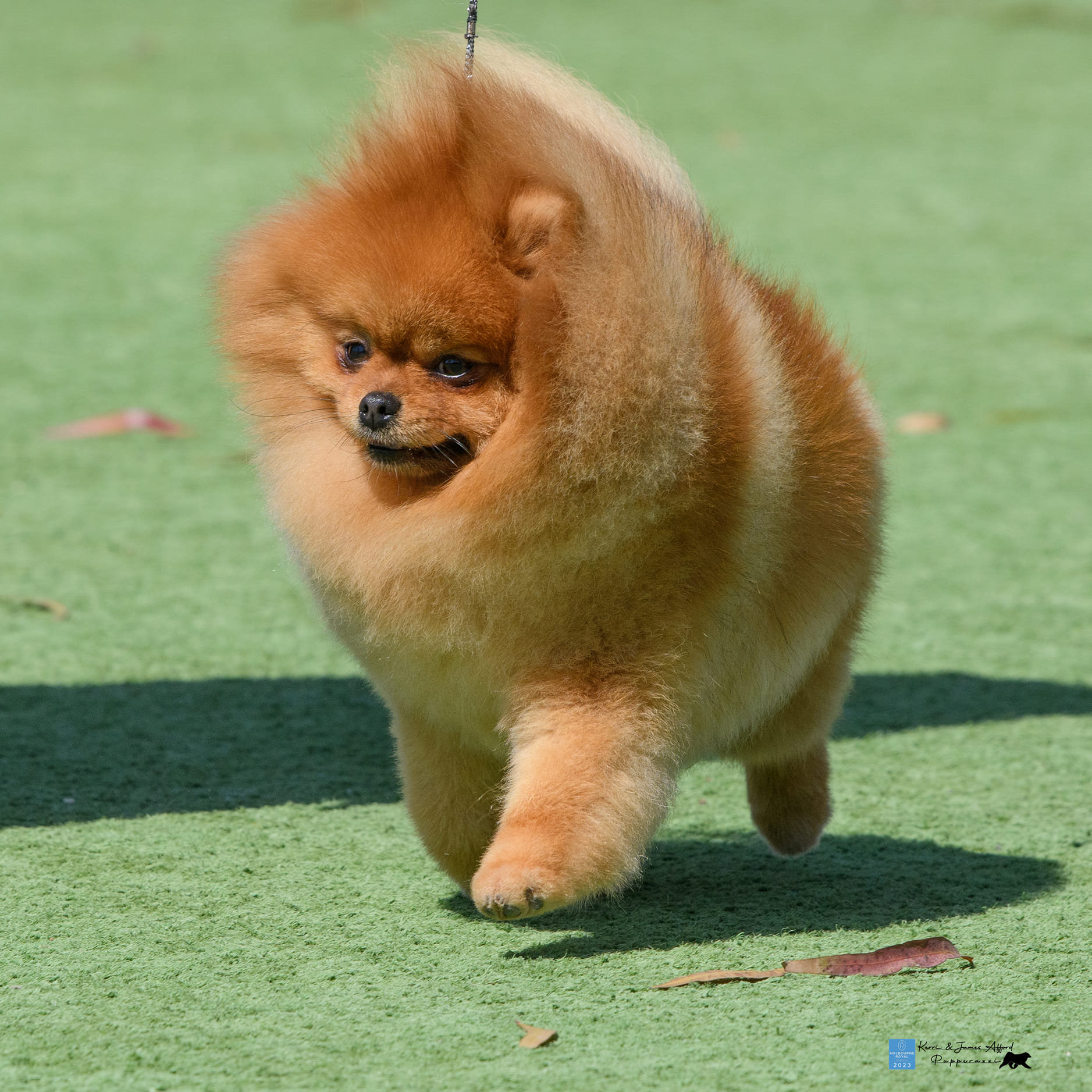Last Updated on 25/04/2024 by Dochlaggie. Post first published on April 8, 2022.
A Pom matures quite fast. There’s no precise age that indicates he is now a senior Pomeranian. The smaller toy dog breeds (the Pomeranian, for example), may be regarded as “senior” when he’s as young as 8 years of age.
In this article, I’ll cover changes that often occur when your Pomeranian grows older. If you have just bought a puppy, it’s important to understand that he’ll age quickly and, as an older Pom, his needs will change significantly.
How Do Pomeranians Age?
Pomeranians have a typical lifespan of 12 – 16 years and they’re still as energetic and happy as when they were younger, provided that you give them the care they need and deserve.
If you have a terrific vet, and if you give him all the care he needs while in your home or when you take him out for walks or other excursions; throw in a pinch of good luck, your Pom may last until he’s 17-18 years old. (If your Pom loses his life at age 12, that’s regarded as normal too.
It may be sad, but all dogs eventually get older. And that means they’re more likely to face health issues. Old Pomeranian problems can be numerous health problems, including those related to genetic and lifestyle reasons.
Senior Pomeranian Care Tips
The good news, though, is that with today’s advanced medicines, a diagnosis tends to take place sooner, which means prevention and intervention can extend your senior Pomeranian’s life.
Older dogs tend to experience health problems over time, rather than suddenly. Be on the lookout for anything that appears to be an issue, no matter how small.
Geriatric Screenings
Once your Pomeranian is between the ages of 7-9 years, the vet should include extra tests when he has his 6-monthly check-ups. These tests are aimed at searching for health problems that older dogs would more likely have to face.
There are four major wellness testing categories for senior Pomeranian which include, Complete blood count, and biochemistry profile. Urinalysis, Thyroid hormone testing, and comprehensive physical examination.
These tests come under the umbrella of geriatric screening and include the following components:
- A comprehensive physical examination.
- Blood tests.
- Maybe an ECG.
- Other special tests according to your Pom’s history and current health.
Vets often recommend a visit twice a year after your dog becomes a senior but Pomeranians MUST be thoroughly checked at least once a year.
Between taking your dog to the vet, and yearly checks for geriatrics, you can learn how to care for your dog properly. Because you live with him, you’ll usually notice any problems with behavior and typical aging signs.
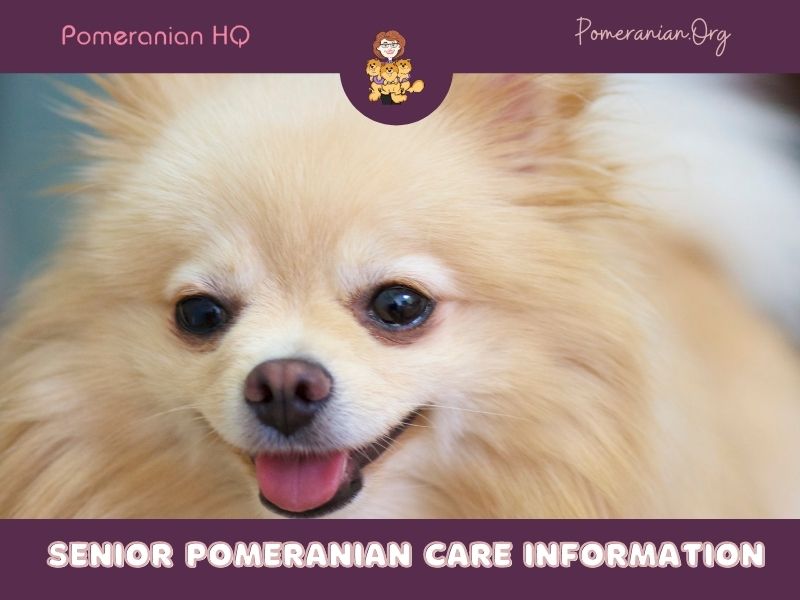
Senior Pomeranians and Their Dental Care
Looking after your dog’s teeth should start when he’s a puppy and keep going for his whole life. If he doesn’t receive the right care throughout his life, once he becomes a senior, you’ll see the effects of negligence, and the potential to shorten his lifespan.
Your dog will suffer from gingivitis, periodontal disease, painful infections, and even tooth loss.
Rotted teeth can easily cause infections in his mouth and gums and the infections can travel to canine vital organs, thereby causing serious damage. In senior Poms, a common, and very serious, the disease is gum (periodontal) disease.
Oral infections due to poor dental care in senior Pomeranians can cause bad breath. You can add half a tablespoon of raw organic apple cider vinegar to your dog’s water bowl, this will help to refresh your senior dog’s bad breath.
Never think it’s too soon or too late to look after your Pomeranian by creating a dental health care plan. During your Pomeranians’ yearly or bi-yearly visits to the vet, he must examine your dog’s gums and teeth thoroughly and professionally.
Changing Your Older Pomeranian’s Exercise Routine
You probably know how important exercise is to people and some of the negative effects of not participating in some form(s) of exercise regularly. Exercise is even more important to a dog because he can’t go for a walk or run on his own, drive to the gym, or play a sport on his own.
Exercise is an integral part of a dog’s emotional, mental, and physical health. If your canine family member is sedentary and sits or lies on the furniture or floor all day long, he won’t be healthy…and it’s your fault.
As dogs grow older, they must still exercise to maintain the health of their circulation, lungs, heart, joints, and digestive system, and to ensure their metabolism stays on track.
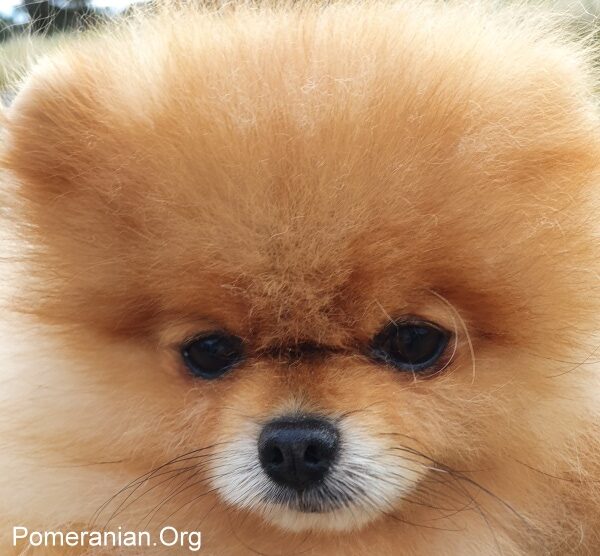
While this is fine for young and adult Poms, when your Pomeranian becomes a senior, you need to adjust the time and type of exercise you’re doing with your dog.
For example, I recommend a routine of two short walks daily each lasting 15 minutes or so. Before heading out, you need to prepare a few things (mainly according to the weather) so your Pomeranian can better enjoy his walks and avoid having any problems.
- Senior Poms feel cold easily. If your Pom shows that he doesn’t cope well with the cold, place a lined vest around him. It will assist in his attempts to manage his core body temperature and keep the cold away.
- Senior Pomeranians are usually sensitive to the different surfaces they have to walk on, making it challenging at times. It’s vital to protect his paws from the icy winter ground as well as the hot surfaces created by the summer sun. Buy a good quality paw wax because it will add a protection layer, create traction, and prevent his paws from drying up. Paw wax is the best option to keep your senior dog’s paws in good shape. Apply paw wax after 7 days and massage the area, wax will be absorbed in seconds.
- A senior dog’s nose may commonly start chapping, peeling, or drying when he’s out in the elements. However, you can heal and protect his nose by applying good quality nose butter.
- Senior Pomeranians can be slightly shaky on their feet or they might search for a way to be better balanced while he’s outdoors. This point is recommended for ALL Poms, it’s vital that you have used a well-fitted harness instead of a collar, whenever he’s on a leash.
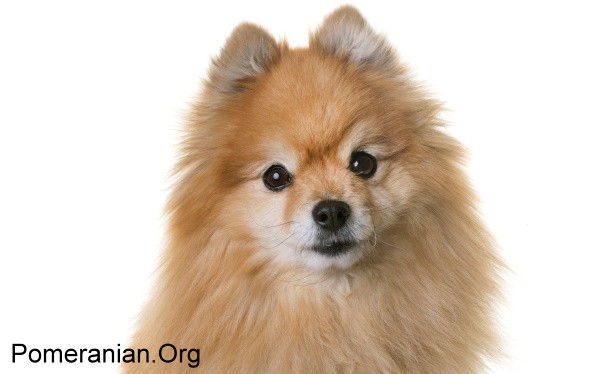
Grooming Your Senior Pomeranian
As a Pomeranian grows older, his coat and skin will undergo certain changes. He’ll slowly lose a certain amount of moisture, making his fur and skin dry and dull.
Because his skin is protected by his coat if his coat is in bad condition that may create further trouble. Dry skin may affect the growth cycle of the coat, making the skin dry out.
Maintain a routine. As Pom slowly ages and becomes a senior, it’s vital that you maintain his regular grooming routine because that’s how he copes.
If you have a senior dog, it’s very important to keep their eyes clean. Regularly clean your senior dog’s eyes to prevent eye infections and dog tear stains.
Regular grooming sessions are an essential part of an older Pomeranian’s life because he has a need for attention and physical contact. Young dogs and puppies are always occupied: playing with toys on their own, running around in a boisterous manner, and playing with other dogs.
However, older Pomeranians don’t possess sufficient energy to run around. A good grooming session can spark energy and be a good diversion instead.
It’s a wonderful opportunity for both you and your Pomeranian to build a certain physical contact and closeness that satisfies and reassures and strengthens your Pomeranian’s feeling of well-being. All of these aspects combine to stimulate and solidify good health.
Choose the best products. Always make the bathroom warm before placing your senior Pom in warm water. If you have the room and/or the water cold, it might cause him to feel chilly as his skin dries out.
His older skin can dry out and become allergic so you must always buy a shampoo that’s high in quality. If unsure, ask a vet for suggestions.
While grooming your Pomeranian, use the time wisely and check for any health problems. Check for growths, tumors, or other issues on, or in his skin.
Run your hands and fingers over every single part of your small Pomeranian’s body, not leaving anything out. This includes his back, tail, legs, abdomen, face, ears, nose, mouth, and so on.
Observe any abnormal response on petting or palpation of the body. Because a close physical examination will allow you to know the exact location of the ailment in your senior dog.
If you can detect a problem early enough, your vet may be able to cure it or, if it’s malignant, at least extend your canine family member’s life by years.
Because the skin is the biggest organ of the body, whether human or canine, it may help identify internal ailments that aren’t visible to the eye.
Look for rough or dry parts of his skin, and all other symptoms that seem unusual. Particularly for fleas, ticks, and mites because they can become route cause of anemia and other health-related abnormalities
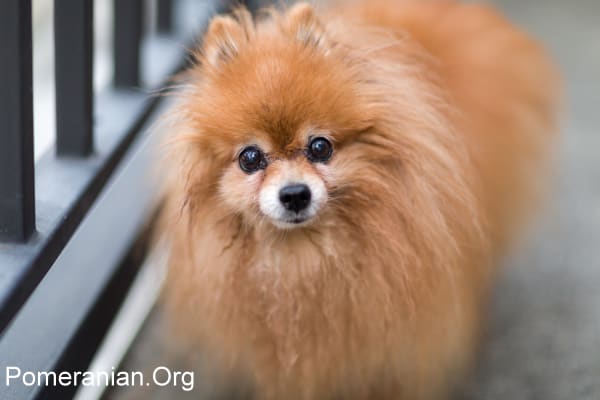
Sleep Time for Your Senior Pomeranian
A senior Pom needs an orthopedic bed as it will help relax his muscles and soothe potentially aching joints so he can be more comfortable while having a good night’s sleep.
Lots of dogs will lay in hallways and doorways so they can watch what you’re doing and where you are. To avoid this, you should find better spots (such as a playpen, a different bed, or one for that purpose,) or even space on certain pieces of furniture) for them to be comfortable and still within your presence.
Giving Medication
The majority of older Pomeranians require one or more medications but it’s sometimes hard to give them to older dogs.
Sometimes, it’s possible to be in liquid form with a pleasant flavor, or as a patch. If his medications are in pill form, you can bury them in a small piece of cheese.
Weight Loss and Reduced Appetite
As Pomeranians grow older, their appetite slowly diminishes. His senses of taste and smell decrease and that usually makes most foods unappealing.
His lifestyle becomes more sedentary so he won’t need as many calories to maintain a healthy weight. On average, he’ll need 50-100 fewer calories each day, compared to when he was young.
There are a few issues to watch for, as they can mean he’s unwell:
- If he has a sudden appetite loss, it could be an early symptom of an impending illness. If he doesn’t eat for a day or more, call your vet urgently.
- A warning of a major problem is when his appetite diminishes to a dangerously reduced point. You best call the vet if this occurs.
- If you have any worries about your Pom’s appetite, call the vet. It’s best to be overcautious than not cautious enough.
- To make his food more appealing, simply heat it up a bit. The reality is that you shouldn’t give your Pomeranian any food that has been in the fridge. It should always be at room temperature or slightly warmer.
- Do some research into the best food for senior Pomeranian dogs and what foods are safe to heat up for your Pom, particularly using a microwave. Ensure food isn’t too hot. You might want to heat up low-sodium chicken broth and dribble it over the food, increasing the *flavor and appeal, and making it easy to chew.
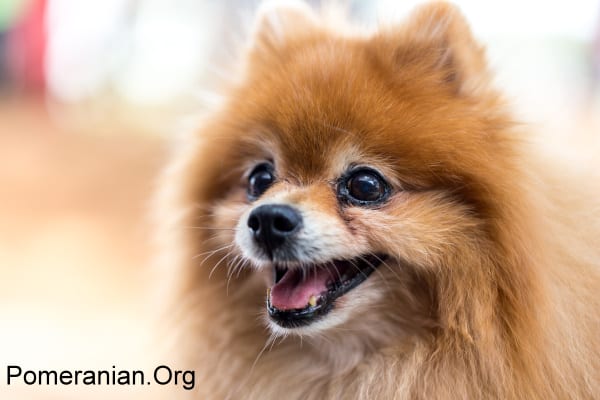
Nutritional Supplements
Good supplement selection is a tricky task, but a few things to keep in mind before selecting of supplements for dogs. Suitable supplements should contain digestive enzymes, vitamins, and minerals and boost the immunity of your dog.
There’s a plethora of supplements for dogs and owners often get confused about which ones are best for seniors because their needs are different from their younger counterparts.
The other factor is that there are plenty of products with a few different names that can confuse what’s best. There are a couple of specific supplements that are ideal for particular problems.
Glucosamine & Chondroitin should be given to all senior Pomeranians. 80% of canines aged 8 and above suffer from arthritis in at least one body part. This occurs because a dog’s body creates less glucosamine as he grows older.
Cushioning between his bones wears thin. Bones start touching each other and wearing thin. This causes a number of troubles with movement as it’s often incredibly painful.
Glucosamine supplement helps in cartilage growth, improving mechanical joint function, thickening of synovial fluid, and slowing the progression of arthritis in senior dogs.
A good quality glucosamine and chondroitin supplement helps strengthen cushioning in his back, legs, hips, and other body parts.
Fish oil (Omegas 3, 6, and 9) can cause a major effect on Seniors with poor coats and/or dry skin issues.
Maintaining Good Hydration Can Be Hard for Older Pomeranians
Senior Poms often find it very hard to remain sufficiently hydrated. There are two main reasons:
- They can simply forget to drink.
- If they have arthritis or pain in their joints, they find it hard to get up and walk around (and this includes walking to the water bowl.
Even if a senior dog is mildly dehydrated, it’s dangerous for him not to drink.
Recommendations to encourage your senior Pomeranian to drink:
- Empty and thoroughly wash a few water bowls several times per day.
- Put them in places where your Pom can easily access them.
- If your senior dog hasn’t had a drink for several hours, take a bowl to him, gently encouraging him to drink, without having to move. (2 hours or so).
A senior Pomeranian’s kidneys might not be working as well as when he was much younger, so impure water isn’t tolerated as easily.
To solve this problem, make sure you filter all water he might drink. That way, you know he’s not drinking any harmful substances. It’s legal for tap water to contain various contaminants including factory runoff, pesticides, and cancer-causing agents. Water should be free from these contaminants.
Companionship
An older Pom might sleep more and prefer more quiet time than he did during his youth. However, simply being present in the family home and hearing voices and other noises as they go about their day.
It’s useful to keep your senior Pom close by and it’s wise to create a few comfortable, orthopedic resting spots in your home’s busiest rooms to make him happy while he spends time with his family.
It’s important to include your senior Pomeranian in as many of your activities as possible, bearing in mind his newer physical limitations. When he was younger, he probably loved long walks but now he might prefer to sit in a dog stroller while you do the hard work and push him around.
If your Pom used to love sitting out in the sun while you do the gardening chores might prefer to sit in the shade on a cooling mat.
Home Environment
Most dogs like routines. Once he becomes a senior, he won’t cope with change easily. For this reason, it’s best to keep his environment at home and his routines the same.
He should be taken for walks to the same places and at the same time every day. Place his food and water bowls in the same spots every day and fill them at the same times.
Ensuring you do all the usual things, including grooming and bedtime (this includes dimming lights and turning down/off any noises) will help the senior Pomeranian feel more secure.
If a dog is going blind, try not to move furniture as he relies more on memory when moving around.
When you briefly visit somebody else at home, ensure you have snacks, his favorite toy, blanket, or anything else to make him feel comfortable. If you know you’ll be visiting for hours, it’s wise to take his bed because he may need a but be unable to relax enough to do so in different surroundings.
Even if he doesn’t nap, laying in his bed and observing what’s happening will increase his comfort level.
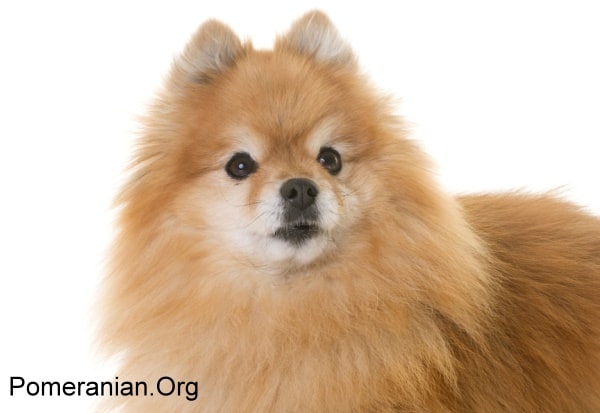
As your Pom becomes a senior, he’ll find it harder to handle slippery floors. He may have difficulty rising and walking on surfaces that don’t have any carpet. You can help by covering the main problem areas with a non-skid/rubber-backed carpet runner or rug.
If that’s not your preferred solution, you can use a good-quality wax for his paws or dog socks that have non-skid bottoms.
When trimming his hair, make sure you trim hairs growing out from under his paw pads as close as possible to avoid having your senior Pomeranian sliding and slipping all over the floor because he can’t gain traction.
If your Pomeranian has trouble with mobility, get pet ramps to allow him easy access to your sofa, bed, or any other favorite spots.
If your Pom does spend time in your bed, the two most popular places are the sofa and the bed. Buying two ramps means you never need to get up and move one if it’s the only one you bought.
Vaccination Changes
The general thinking concerning senior dogs and vaccinations recently changed.
There are many more vet professionals who believe there’s a reduced need for vaccinations for dogs aged 10+ for two reasons:
- They have a compromised immune system.
- OR their body has sufficient antibodies stored over a period of 10 years.
Because vet clinics will vary in their thinking, it’s up to you, the owner, to discuss the situation and see what shots should or shouldn’t be given and when.
Some vets believe the rabies shot shouldn’t be given at precisely the same time as anything else. In numerous places, a letter saying a dog isn’t healthy enough to be given the rabies shot is as acceptable a form of proof as verification that the Pom has been immunized usually is, all for legal purposes.
Regardless of the age of a dog, if they have any type of illness, they won’t be given vaccinations. For example, a senior dog with cancer, or something equally as serious, won’t receive any vaccinations to prevent his body from becoming more overwhelmed than it is at the time.
Ask the vet if it’s worth doing a titer test. This checks the level of antibodies in your senior Pom’s body. If there are sufficient, there’s no necessity for a booster shot.
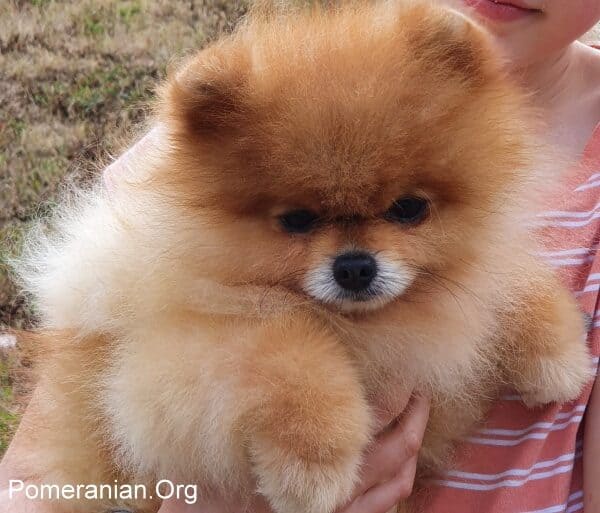
Preparing Your Senior Pomeranian for Winter
During winter, it’s critical to concentrate on the extra needs of senior Pomeranians. They’re highly susceptible to extreme temperatures and other dangerous conditions that occur in this harsh season.
Does he require a sweater or raincoat? Clothing can help protect older dogs from the harsh elements outside. Wet fur (from rain and/or snow) will reduce your Pom’s capacity to fight the cold weather. Even if he coped as a young dog, old age reduces any dog’s ability to cope with everything Mother Nature throws at the world.
Are there any drafts blowing on your senior Pom’s sleeping areas? Have you included a thick mattress pad and a blanket in his bed so he can snuggle under or sleep on?
How about moving his bed to a less drafty location? Remember that he needs retraining whenever and wherever you move it.
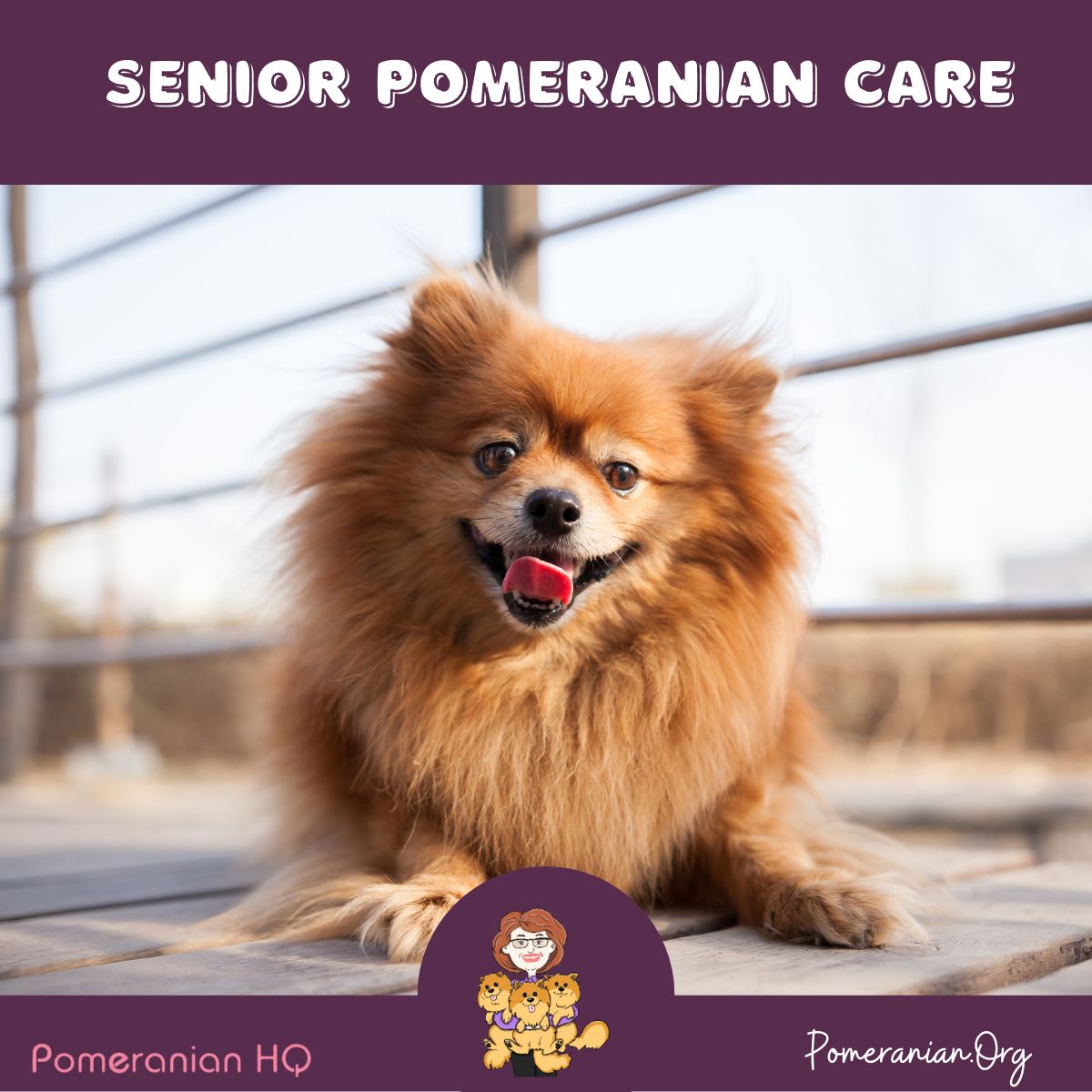
Major Indicators of Senior Pomeranian Health Issues
Weight Loss
If this occurs for no apparent reason, it’s a precursor to numerous health problems that can range from an infection to full-blown diabetes. If a Pomeranian loses even a pound or two, you’ll notice it along his rib cage when you pick him up. You should see how much he has lost after you have washed him because his wet coat clings to his ribs.
Serious Appetite Loss
A dog ages naturally and generally his appetite will decrease. It’s common for his appetite to slow so he’ll eat less food. Unfortunately, this is the first indicator of numerous maladies. When you notice this happening, you should make an appointment so the vet can check him to make sure there are no other underlying problems.
Intestinal Distress
Vomiting and diarrhea can be trouble for toy dog breeds and are even more of a problem with young pups and senior Pomeranians as they have a greater vulnerability to dehydration, a common problem after the body has released more liquids than normal.
If your Pom shows such signs then immediately stop the food which is causing gastrointestinal upset and consult with a veterinarian for expert advice.
Vomiting and diarrhea can lead to fluid and electrolyte imbalance in dogs, in such circumstances fluid replacement therapy is recommended to avoid further health abnormalities.
Increased Thirst
If you see your Pomeranian drinking more than he usually does, without any increase in activities, and he also urinates more, these are potential indicators of diabetes. Book your dog in for your vet to test him to find out whether diabetes is the case, or if there’s another underlying cause.
Lethargy
If your Pomeranian gets tired much faster than when he was a puppy, it’s normal. However, there may be a disease affecting his lungs and/or heart. If you feel troubled by what’s happening, take him to the vet (after all, he’s a professional in all things canines). He’ll rule out issues with your dog’s cardio-pulmonary systems.
Once your dog has become a senior, you should consider modifying his routines so he’s not overdoing it. For example: take him for two smaller walks each day, not one long walk.
Coughing and Too Much Panting
This could mean he has heart disease or lung problems. If such symptoms continue, long after you have changed his range of exercises, the next step is to contact your vet.
There might be certain changes in behavior alterations once a dog becomes a senior. They include a reduced tolerance for commotion and noise. Particular activities can be a little overwhelming. Older, senior Pomeranians can have a reduced patience for crowded rooms and young kids.
Numerous senior Poms cope best if they have a quiet area they can to, that feels safer but is still near their family’s various activities without being caught up in the loud, overwhelming chaos.
When Pomeranians are in their early teens (13+ years of age), a typical issue is the decline of cognitive abilities.
Symptoms may include disorientation, lack of attentiveness, walking in circles, becoming withdrawn, and barking for no apparent reason. Although this is because they’re getting older, speak to the vet about these symptoms if they exist.
Best Food For Senior Pomeranian Dogs
As a dog ages, his metabolism slows. Exercise becomes more trying and fewer calories are expended. Thus, special diets should be used for pets over five years old. You can create these in tandem with your veterinarian’s suggestions.
The best dog food for senior Pomeranian dogs will also need to contain more fiber than younger Pomeranians, for the same reason as older humans.
However, they also need enough vitamins, minerals, fat, and protein. Some owners decide to stick with their Pomeranian’s typical foods, offering them in smaller portions. Other owners choose special senior Pomeranian food specifically created for senior dogs.
The best food for senior Pomeranian dogs has a basic protein content of around 18 percent (14 percent for Poms suffering from kidney disorders), a basic fat level of 10-12 percent, and a basic fiber level of 3-5 percent.
They also may contain additives like minerals, beta-glucan, omega 3 and 6, glucosamine, and vitamins. It’s good to add probiotics to senior dog food because these beneficial microflorae will help in digestion and will boost your Pomeranian’s immune system.
You’ll find food suitable for older Pomeranians in cans or bags in commercial stores or through your veterinarian. If your dog gets a bit fussy, just warm the food slightly to increase the taste and smell and he’ll most likely munch away!
Best Dog Food for Senior Pomeranian Dogs
I recommend Royal Canin Size Health Nutrition Small Adult Dry Dog Food.
How to Handle Problems with Senior Pomeranian Senses
As with people, dogs grow old. They can have issues with poor cognitive functions and their senses growing weaker. However, dogs are more capable of handling such changes than most older people.
As he grows older, the usually black pupils of his eyes start becoming a little hazy. It’s normal for a dog and only minimally affects his sight. However, if the pupils turn white or grey, it’s likely that he has cataracts.
New Treatment for Older Pomeranian Eye Problems
A new treatment for this condition involving the use of eye drops is now available for humans. Hopefully, this new way of treating cataracts will be available soon for our canine friends too.
A dog eye specialist can operate and take out the affected lens. An artificial lens can be inserted in its place. This is the same way that people have their eyesight improved.
Eye surgical intervention is classed as elective surgery, and you can delay until you feel your Pom is able to handle the surgery.
Your vet needs to ascertain two major elements before operating:
- Is your beloved older blind Pomeranian healthy enough to handle eye surgery and the recovery process?
- Is your dog’s retina still working properly? After your dog has the cataract procedure done, he’ll need lots of love and care but it’s certainly worth it for you and your dog. If he goes blind, his life will change dramatically, as will yours. Unfortunately, there are sometimes problems with eyesight that can’t be cured. You might not even realize he’s slowly losing his vision until he’s virtually blind.
To assist your older blind Pomeranian in getting around safely, there are a few precautions you’ll need to take immediate action on, so he can lead as “normal” a life as possible if he does go blind.
Actions include:
- Always placing food and water bowls together in the same place.
- Adding a tag to your dog’s collar with your contact information and noting your dog is blind.
- Not moving furniture unless necessary.
- Closing off hazardous areas such as your pool, staircases, and anything else where he may stumble and falls and hurt himself.
- Use smells and sounds around your home to help him work out where he is. Examples include ticking clocks, radios or CDs, perfumed face towels or other fabrics, and smelly shoes that always get put in the same place.
- Create paths he can touch. For example, use gravel paths outside or carpet runners inside. As with people, most blind dogs can go on to lead long, relatively normal lives.
Senior Pomeranian Loss of Hearing
Older Pomeranian dogs often succumb to hearing loss. They can hear very high-pitched noises but that’s the initial problem. If your dog doesn’t react when you call or whistle for him, try using a lower voice.
Hearing aids are not good for dogs. So it’s up to you to retrain him to communicate in different ways. Hand signals can be understood quite easily.
If he’s outside and you call him to come inside, he may not respond so train him to come in when you turn the porch light on and off a few times. It’s critical to pat your dog a lot so he doesn’t think that you have stopped talking to him.
Loss of Cognitive Functions in an Old Pomeranian
If your old Pom seems to be pacing up and down, wandering around aimlessly, or standing in a corner and wondering what to do, he may have an issue with cognitive dysfunction. In other words, his thought processes aren’t as sharp as they used to be.
Your vet may prescribe various medications to help. However, the process can take weeks or even months, and even then, there’s no guarantee it may work. Dogs vary in how they react to medications.
Owners of senior Pomeranian dogs that have had remarkable results are extremely happy, with their Poms back to “normal.”
There are other ways you can help. Provide small challenges to make your dog think more…teach him new tricks or games. If he still loves the games he played in his younger days, you can keep doing them as well.
However, don’t do too much because he’ll tire easily. Fewer activities that require a lot of energy are ideal. For example, hide some treats and get your pet to look for them. Car trips are fun because they’re not draining him of precious energy and he gets to see new sights.
Having you for the company is what all dogs crave. Studies have proven results that doing these things will help avoid a reduction in mental capacity.
Senior Pomeranian Health Issues
Humans suffer from more health problems as we get older. The same thing applies to your Pomeranian dog.
Older Pomeranian problems can include bones, joints, kidneys, heart, brain, and various other organs. Cancer is more likely to occur in older dogs as well.
Your senior Pomeranian dog needs more preventive actions to avoid such problems. Have the vet do a full examination twice every year. Older Pomeranian dogs will need more things checked. For example, blood tests are essential because they can reveal all sorts of real and potential problems such as anemia, clots, high white blood cells, infections, deficiencies in vitamins and minerals, and so on.
Tests can determine if your beloved dog has diabetes, liver or kidney failure, and other health major concerns.
Typical Senior Pomeranian Health Issues
Pomeranian Arthritis:
Poms remain cheerful for most of their lives. However, you shouldn’t push older dogs as hard as young dogs when it comes to physical activities. Use a doggy ramp or steps to help him get on and off furniture instead of making him jump and cause injuries.
Older Pomeranian dogs should still get some physical exercise but when it comes time for a rest, ensure their bed is soft and comfortable. Short walks will most likely be all he can handle. Your vet may prescribe certain medications to improve the arthritic joint and ease Pomeranian arthritis symptoms.
Certain medications can help rejuvenate cartilage and increase collagen production. Most pharmacies can help with some of these drugs.
Old Pomeranian Body Odor:
The smell of an older dog is generally more powerful than that of a younger one. The most common causes are ear infections, teeth issues, and kidney disease.
Senior Pomeranian Body Temperature:
As dog’s age, they become more susceptible to cold and heat. If he’s too hot and is panting, or if he’s shivering from the cold, do what you can to help him feel better.
Pomeranian Dry Skin and Coat Changes
As they grow older, dogs lose a lot of the moisture in their skin, thus making it itchier. Brush him regularly and you’ll stimulate the production of oil and more moisture will be created. When washing your beloved Pom dog, use a moisturizing conditioner.
Senior Pomeranians may experience coat changes with thinning coats and brittle fur common in an old Pomeranian dog.
Issues with Older Pomeranian Teeth
It is not unusual for problems with an older dog losing teeth. Senior Poms often have issues with their teeth including licking lips, doggy breath, a dislike for chewing, and avoiding your hands touching their mouth. However, these issues tell you that a visit to the vet is needed. He can pull out any loose teeth and give your old Pomeranian dog’s mouth a clean and check up to detect other issues.
Senior Pomeranian Digestion Problems
Diarrhea and vomiting both cause dehydration and an energy drain in older Pomeranian dogs and this can happen quite fast. Liver or kidney troubles may be the cause. As he’s older now, you shouldn’t delay in getting him to your vet.
Immune System Issues
Older Pomeranians have a weaker immune system so regular vaccinations are critical. If he spends all his time at home, you may not need them all but ask your vet because these decisions can change.
Older Dogs Are Prone to Numerous Other Health Issues
Diabetes, cancer, kidney disease, heart disease, and liver disease. Cushing’s syndrome (there’s too much cortisol in his system) is another serious health problem. It can cause your dog to have a pot belly as well as other symptoms including diarrhea, weight loss, a runny nose, coughing, changes in his appetite, a distended abdomen, extra thirst, and more frequent urination.
Letting Go and Saying Goodbye
As with humans, a time can happen when you’ll need to decide the best way to let a canine member of your family pass on to the great Kennel in the sky. The time when it will most likely occur is when your dog has reached senior age and is suffering from a seriously diagnosed medical condition that can’t be treated or eased with medication.
In a situation like this, you should always get a second opinion, regardless of the length of time you have dealt with your current vet, or how much you might trust him.
Then you’ll know for sure that what you have been told is 100% correct.
It’s possible that another vet or dog specialist could propose an alternative treatment plan and/or diagnosis.
Euthanasia is never a decision to be taken lightly and, in the end, it needs to be based on the level of pain your dog is enduring. Pets rely on us to look after their every need, and that includes not letting them suffer.
Once you arrive at the point where a decision must be made, it’s important to remember that part of truly loving your four-legged family member is ensuring his needs are considered ahead of yours.
If he’s suffering most of the time, you can choose to feel the intense emotions that saying goodbye will release but it’s necessary so you can allow your close friend to receive the gift of not suffering any longer. It’s the most caring, unselfish thing for you to do.
If you’re ever in this position, my thoughts are with you and I sincerely hope this information helps you manage this sad, but sometimes necessary, situation.
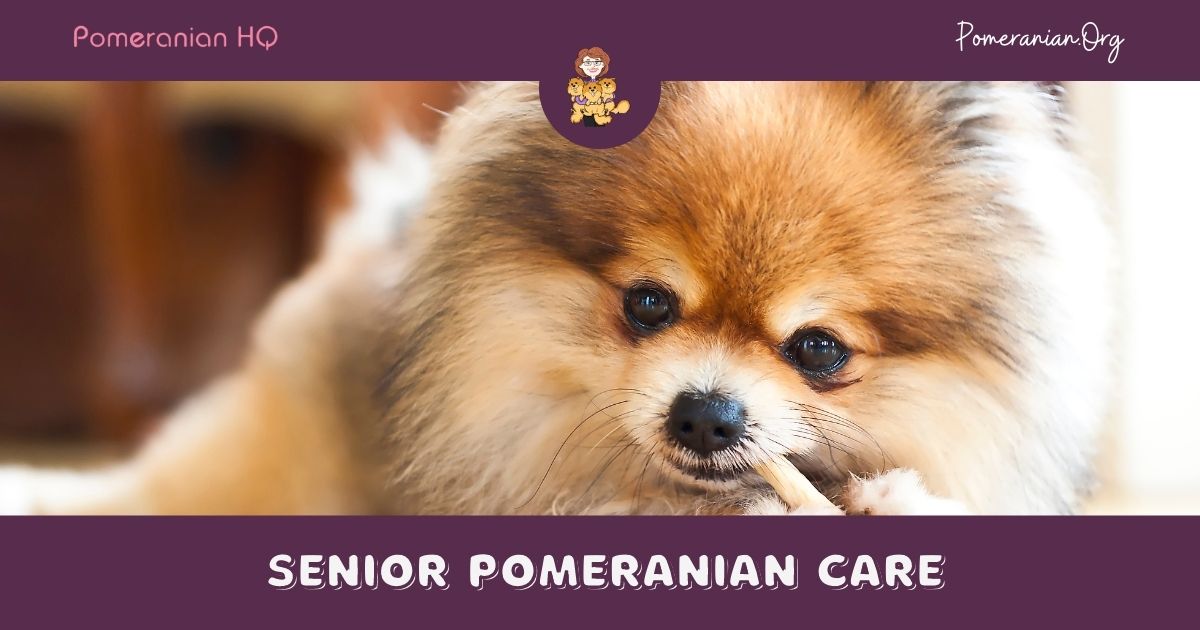
Final Thoughts on Senior Pomeranian Care
The majority of ailments that older Pomeranian dogs face can be treated and cured providing that you take action as soon as possible. The “wait and see” approach isn’t wise as an old Pomeranian will become dangerously ill faster than young dogs.
Always contact your vet if you see any unusual symptoms. It’s best to be safe than sorry.
N.B. This article regarding Pomeranian health issues was written in consultation with our resident veterinarian.
Dr. Muqeet Mushtaq
DVM, University of Animal and Veterinary Sciences, 2019
MSc. (Hons.) (Animal Breeding & Genetics), University of Agriculture Faisalabad, 2021
Disclaimer: The Content is not intended to be a substitute for professional veterinarian advice, diagnosis, or treatment. Always seek the advice of your veterinarian with any questions you may have regarding the medical condition of your dog. Never disregard professional advice or delay in seeking it because of something you have read on ANY website.
Copyright Pomeranian.org. All Rights Reserved.
References and Further Reading:
[1] Denise Leo “The Pomeranian Handbook”.
